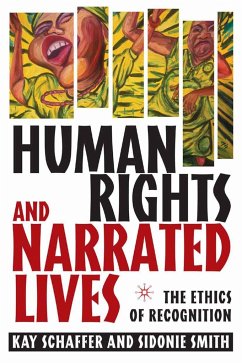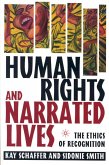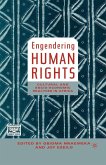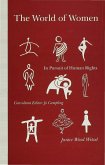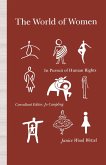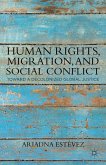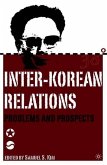Personal narratives have become one of the most potent vehicles for advancing human rights claims across the world. These two contemporary domains, personal narrative and human rights, literature and international politics, are commonly understood to operate on separate planes. This study however, examines the ways these intersecting realms unfold and are enfolded in one another in ways both productive of and problematic for the achievement of social justice. Human Rights and Narrated Lives explores what happens when autobiographical narratives are produced, received, and circulated in the field of human rights. It asks how personal narratives emerge in local settings; how international rights discourse enables and constrains individual and collective subjectivities in narration; how personal narratives circulate and take on new meanings in new contexts; and how and under what conditions they feed into, affect, and are affected by the reorganizations of politics in the post cold war, postcolonial, globalizing human rights contexts. To explore these intersections, the authors attend the production, circulation, reception, and affective currents of stories in action across local, national, transnational, and global arenas. They do so by looking at five case studies: in the context of the Truth and Reconciliation processes in South Africa; the National Inquiry into the Forced Removal of Indigenous Children from their Families in Australia; activism on behalf of former 'comfort women' from South/East Asia; U.S. prison activism; and democratic reforms in the aftermath of the Tiananmen Square Massacre in China.
"Schaffer and Smith's book is stunning and pathbreaking. Its narratives profoundly translate into human terms the meanings of sexual servitude, political repression, the theft of children, and more. Through its theory of narratives, the book frames a new vision of justice that links literature (storytelling) to politics (social movements) to law (human rights). A must-read for all advocates of social justice." - Eric K. Yamamoto, Professor of Law, University of Hawaii, and author of the award-winning book Interracial Justice: Conflict and Reconciliation in Post-Civil Rights America
"Eloquent testimony to the power of narrative and personal testimony, Human Rights and Narrated Lives tells of Korean comfort women, kidnapped children, torture victims, and political prisoners - a chorus of voices demanding recognition. Simply the best book on the role of storytelling in the search for justice." - Richard Delgado, Professor of Law & Derrick Bell Fellow in Law, University of Pittsburgh
"This book brings to light important alternative perspectives to those offered by governments and the media. It personalizes and humanizes, through its narratives, these traumatic world events." - Pat Chew, Professor of Law and editor of The Conflict and Culture Reader
"This book brings together two significant features of our times: the vocabulary of human rights and the technique of personal storytelling. It weaves politics and literature together to provide a rich and productive analysis of the global fight for justice. The book shows us that there are many ways of recognizing injustice and abuse of rights and the value of the narratives of peoples' lives in making the case for action to promote justice." - Hilary Charlesworth, Professor of International Law, The Australian National University
"Eloquent testimony to the power of narrative and personal testimony, Human Rights and Narrated Lives tells of Korean comfort women, kidnapped children, torture victims, and political prisoners - a chorus of voices demanding recognition. Simply the best book on the role of storytelling in the search for justice." - Richard Delgado, Professor of Law & Derrick Bell Fellow in Law, University of Pittsburgh
"This book brings to light important alternative perspectives to those offered by governments and the media. It personalizes and humanizes, through its narratives, these traumatic world events." - Pat Chew, Professor of Law and editor of The Conflict and Culture Reader
"This book brings together two significant features of our times: the vocabulary of human rights and the technique of personal storytelling. It weaves politics and literature together to provide a rich and productive analysis of the global fight for justice. The book shows us that there are many ways of recognizing injustice and abuse of rights and the value of the narratives of peoples' lives in making the case for action to promote justice." - Hilary Charlesworth, Professor of International Law, The Australian National University

